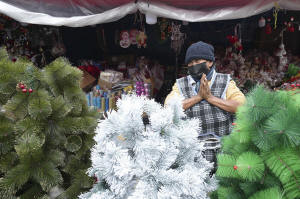As Christmas nears, Ecuador's homes get a break from power cuts but
companies still face rationing
 Send a link to a friend
Send a link to a friend
 [December 23, 2024] By
GABRIELA MOLINA [December 23, 2024] By
GABRIELA MOLINA
QUITO, Ecuador (AP) — As Christmas approaches and people decorate their
homes with lights, Ecuadoreans are getting some relief from the severe
power cuts that have hounded the country this year with President Daniel
Noboa saying there will be no power rationing for residential areas -
for the time being.
But some of the country’s largest mines, cement factories and steel
mills will not be so lucky, facing continued power rationing in the last
two weeks of December, according to Ecuador’s Ministry of Energy. And
there are no assurances the rationing will stop next year.
This discrepancy between residential and industrial areas has raised
concerns in Ecuador’s business community over the future of the economy.
Companies in the South American nation are losing an estimated $700
million each week from daily power cuts, according to the chamber of
commerce in Guayaquil, Ecuador’s largest city.
Ecuador’s latest power rationing scheme, which began on Dec. 20, has
also prompted some analysts to question whether President Noboa is using
the nation’s scarce supply of electricity for political ends.
Ecuador will hold presidential elections in February and Noboa, a
conservative who has promised to fix the nation’s electricity crisis and
tackle its growing problem with drug gangs, is planning to run for
reelection.
The 37-year-old was voted into office i n a snap election at the end of
last year after his predecessor was forced to dissolve congress amid a
corruption probe, and end his term prematurely.

“Noboa wants to stop people from being frustrated, or angry with the
government,” said Hernan Reyes a political scientist at the Universidad
Andina in the capital Quito.
For Esteban Ron, the dean of social sciences at Quito’s SEK University,
Noboa’s decision to suspend power cuts in residential areas is part of
an effort by the president to “redeem” himself with Ecuadorean voters
and “show that he is fighting for the people.”
Ecuador since the end of last year has been struggling with power cuts
that the government attributes to mismanagement of power plants and a
dry spell caused by the El Niño weather pattern.
[to top of second column] |

Christmas tree vendor Maria Constante waits for customers, in Quito,
Ecuador, Tuesday, Dec. 3, 2024, amid power rationing that she says
have slowed sales. The government of President Daniel Noboa decided
to suspend daily power cuts during the end-of-year holidays (AP
Photo/Dolores Ochoa)
 The nation of 15 million people
invested heavily in hydroelectric power over the past two decades as
it looked to promote cheap and renewable energy sources. But it has
few alternatives to the electricity generated at its dams, which
produce between 70% to 90% of Ecuador’s monthly power supply
As rain in Ecuador dropped to its lowest levels in 60 years this
summer, the government was forced to implement power cuts in many
cities lasting up to 14 hours a day.
But last week the Noboa administration said in a statement that
weather conditions have been improving and that maintenance problems
at some of Ecuador’s hydroelectric plants have been fixed. Ecuador’s
government also said a deal had been made to import electricity from
neighboring Colombia, eliminating the need for power cuts in
residential areas.
Business leaders in Ecuador remain concerned over the continuing
cuts at industrial sites and question whether it is wise to
prioritize residential areas.
“You cannot sacrifice production and employment in order to make
promises (to residential areas) that may not last,” said Patricio
Alarcon, the former president of Quito’s chamber of commerce.
Marco Acuña, the president of Ecuador’s national guild of engineers,
said power cuts could return to residential areas after the holidays
because Ecuador still has not substantially diversified its sources
of energy.
Acuña said power plants using fossil fuels in Ecuador are currently
producing less than 40% of the electricity they are designed to
generate due to problems with engines and machines. He said the
recent agreement to import electricity from Colombia will only cover
about 8% of Ecuador's daily needs.
In the meantime, the citizens of Ecuador are enjoying their respite
from the daily power cuts.
“I hope people come to buy things with the same enthusiasm as
before” said Pablo Parra, a street vendor who sells Christmas trees
and lights in Quito.
All contents © copyright 2024 Associated Press. All rights reserved |